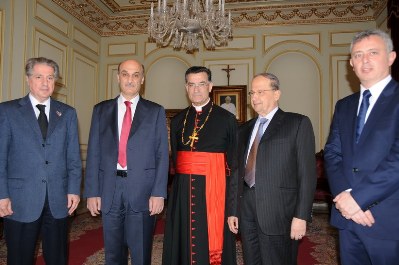
Free Patriotic Movement official Dr. Mario Aoun stressed Monday that Marada Movement chief MP Suleiman Franjieh cannot “bypass” the other three Maronite leaders in the country in order to reach the Baabda Palace, stressing that the keys to the presidency are in Rabieh and urged “corrective steps” from Franjieh regarding his ties with Change and Reform bloc chief MP Michel Aoun.
Rabieh, a suburb of Beirut is where MP Michel Aoun resides.
“General Michel Aoun is an essential and key candidate and he has not yet said that he has ceased to be a presidential nominee,” Dr. Aoun told al-Jadeed television.
“He was still a candidate when Mr. Suleiman Franjieh’s nomination occurred without the knowledge of General Michel Aoun or any talks with him,” he noted.
Dr. Aoun underlined that “any of the strong four candidates should not bypass the others to reach his goal.”
“It is unacceptable for the process to be in this manner,” he emphasized.
“We are awaiting ‘corrective steps’ from Suleiman Beik Franjieh to correct the moves that he has so far carried out,” he added.
“We cherish him and he is still one of us. He remains an ally and a friend but a certain mistake might have been committed and it can be corrected,” Aoun urged.
As for MP Michel Aoun’s candidacy, the FPM official stressed that Aoun is “not so keen on his own nomination,” adding that “the issue is related to the proper representation of Christians.”
“Would the other camp accept that General Aoun name the Sunni premier or the Shiite parliament speaker? Certainly not,” he added.
He also noted that Franjieh’s “northern popular base” cannot be compared to Aoun’s representation across the country.
As for the FPM’s relations with the Lebanese Forces, Aoun noted that “there are talks and coordination with the LF,” adding that “these two Christian parties are dismayed by the manner in which Franjieh’s nomination happened.”
“If Franjieh has guarantees, he can inform General Aoun of them, and the ‘keys of the presidency’ are in Rabieh,” al-Jadeed quoted Dr Aoun as saying
In Lebanon’s confessional power-sharing system the position of president is constitutionally prescribed to a Maronite Christian.
The March 14 block nominated Lebanese Forces leader Samir Geagea for the presidency , while Hezbollah nominated Aoun as the March 8 block’s candidate .
Neither Aoun nor Geagea – both former civil war-era warlords and polarising figures – were likely to attain the requisite votes in parliament to gain office. Their nominations constituted a political face-off between the March 8 and March 14 blocks aimed at delaying the presidential election until a regional consensus on a nominee was agreed.
For the 32nd time in a row, and despite renewed optimism, Lebanese politicians last week failed to elect a president.
What brought change recently was the suicide bomb attacks by the Islamic State group on 12 November that rocked Beirut. Both Hezbollah chief Hassan Nasrallah and Future Movement leader Saad Hariri emphasised the importance of national dialogue and called for an end to the presidential vacuum.
After the bombing, Lebanon saw a flurry of political activity with Hariri meeting French President Francois Hollande in Paris and the Parliamentary Speaker Nabih Berri holding national dialogue talks at his house. Then last week, Lebanese media suddenly reported that Hariri was preparing to back the presidential bid of Suleiman Franjieh.
Franjieh appears like an odd choice for Hariri. Franjieh is a key member of the March 8 alliance , a former interior minister with family ties to Syrian President Bashar al-Assad and his father Hafez dating back to the 1950s.
Hariri , who has has been highly critical of Assad’s conduct during Syria’s civil war views the Syrian government as responsible for the assassination of his father, Rafik, in central Beirut in 2005. The killing sent shockwaves through Lebanon and eventually led to the end of three decades of Syrian occupation.
Lebanese media reports claim that Franjieh’s nomination had the backing of regional and international actors including Saudi Arabia, Iran, the United States and France, who have long been at odds about who should rule Lebanon.
Hariri was expected to make a return to Lebanon last week to follow up on the political settlement that could see Franjieh officially nominated for the top state post, al-Mustaqbal daily reported .
However, the stances of Christian parties rejecting the nomination of Franjieh have pushed Hariri to delay the visit, said the daily.
Meanwhile Maronite Patriarch Beshara al-Rai has been urging the political factions to come together and to “seriously” take into consideration the new initiative aiming at ending the presidential vacuum.

Leave a Reply
You must be logged in to post a comment.